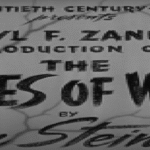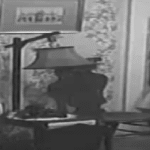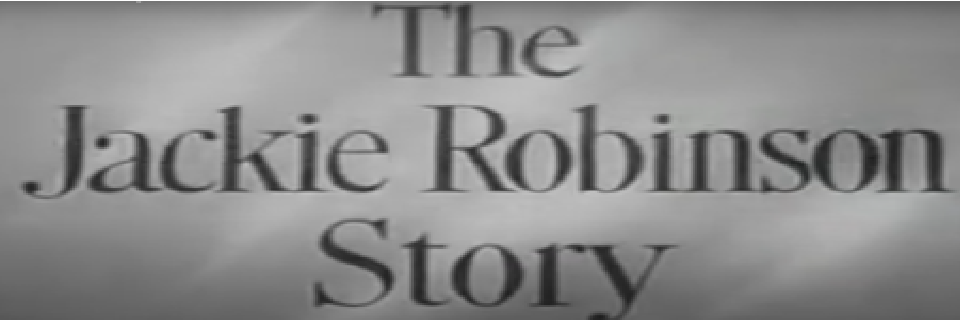The Jackie Robinson Story, released in 1950, is a biographical sports drama that chronicles the groundbreaking journey of Jackie Robinson, the first African-American to break Major League Baseball’s colour barrier in the modern era. Directed by Alfred E. Green and starring Jackie Robinson as himself, the film presents an inspirational and restrained portrait of courage, dignity and perseverance amidst the harsh realities of racism in mid 20th century America.
The film opens with Jackie Robinson as a boy in Pasadena, California, where he is already showing signs of athletic prowess. The narrative then follows his early life and development, offering glimpses into his background and the challenges he faced as a young black man in a racially segregated society. He is portrayed not only as a talented athlete but also as a thoughtful and principled individual raised by a strong mother who instils in him the importance of self-respect and quiet resilience.
As Jackie grows older, his sporting abilities continue to shine. He excels in multiple sports including football, basketball, track and of course baseball. Despite his success, he faces constant reminders of the limitations imposed upon him because of his race. His dreams of becoming a professional athlete seem unattainable, as black players are barred from the major leagues. Jackie plays in the Negro Leagues, where he makes a name for himself with the Kansas City Monarchs, yet the shadow of segregation looms large.
The turning point in Jackie’s life arrives when he is invited to meet Branch Rickey, the general manager of the Brooklyn Dodgers. Rickey, played in the film with a mix of sternness and vision, is determined to integrate Major League Baseball. He believes that Robinson has both the talent and the temperament to endure the immense pressure and hostility that will come with breaking the sport’s longstanding racial barrier.
Their meeting is intense. Rickey outlines the abuse Robinson will inevitably face, from racist taunts and exclusion to potential violence. He insists that Jackie must have the courage not to fight back, no matter how cruel the provocation. Robinson agrees, not because he is meek, but because he understands the greater significance of the moment. It is one of the film’s most powerful scenes, highlighting the difference between true strength and retaliation.
Jackie is signed to the Dodgers’ minor league affiliate, the Montreal Royals. His arrival in the league is met with suspicion and outright hostility. Some team-mates protest his inclusion. Fans heckle him. Opposing players try to provoke him. In one game, a pitcher repeatedly throws at his head. Through it all, Robinson maintains his composure and lets his performance speak for itself. His dignity and skill begin to win over sceptics and opponents alike.
Eventually, Jackie is called up to the Brooklyn Dodgers, making his historic debut in 1947. The film depicts this moment with quiet reverence, underscoring not just the personal achievement, but the broader cultural impact. Jackie Robinson was not just playing baseball — he was redefining what was possible for an entire generation of black Americans.
Throughout the film, Jackie’s relationship with his wife, Rae, serves as a source of emotional grounding. Rae is portrayed as supportive and strong, providing encouragement during his most difficult moments. Their love and partnership offer a human dimension to the story, showing that Robinson’s journey was not a solitary one, but carried out with the support of loved ones and allies.
The film does not overly dramatise Robinson’s struggles, nor does it sanitise them. It takes a measured and earnest approach, focusing more on his perseverance and character than on depicting acts of overt racism in graphic detail. This choice, while partly due to the era’s filmmaking constraints, lends the film a certain dignity. It conveys its message through restraint, relying on subtle moments and quiet triumphs rather than melodrama.
One of the film’s strengths is its casting of Jackie Robinson in the lead role. Though not a professional actor, Robinson delivers a sincere and affecting performance. His portrayal has a natural authenticity that no actor could have fully replicated. There is something undeniably moving about watching Robinson reenact the most pivotal moments of his own life, from boarding segregated buses to receiving his first ovation in a major league stadium.
The latter parts of the film follow Robinson’s growing success on the field and the gradual acceptance he earns within the sport. Teammates who once resisted his presence become defenders. Reporters begin to shift their tone. Crowds cheer not just out of novelty, but in recognition of his excellence. Jackie Robinson’s impact transcends sport, inspiring a movement and laying the groundwork for future civil rights progress.
The film closes on a hopeful note. Robinson has established himself as a star, not simply because of his ability, but because of his character. He has opened a door that had long been shut, and done so without compromising his integrity. The story ends not with grand declarations, but with a sense of resolve — a quiet confidence that the world has changed, even if only slightly, because one man dared to believe that it could.
The Jackie Robinson Story is more than just a sports film. It is a document of its time and a bold statement made just three years after Robinson’s debut with the Dodgers. In a period when segregation was still law in much of America and resistance to racial integration remained fierce, the film dared to present a black hero with intelligence, grace and quiet strength.
It is also noteworthy for being released before the major civil rights victories of the 1950s and 60s. In that context, the film is remarkably forward-thinking. It does not portray Robinson as a flawless man, but as someone who made an extraordinary choice to endure injustice for the sake of those who would come after him.
While the film’s tone is somewhat reserved by modern standards and lacks the cinematic complexity of later biopics, its sincerity remains compelling. The black-and-white cinematography, modest production values and straightforward narrative contribute to its authenticity. It stands as an honest and heartfelt tribute to a man whose real-life courage changed American sport and society forever.
Ultimately, The Jackie Robinson Story is a film about dignity in the face of adversity, and about how a single individual can challenge centuries of prejudice through quiet resolve and unwavering principle. It reminds viewers that true greatness is not measured only by accolades, but by the moral courage to do what is right when the cost is highest.







